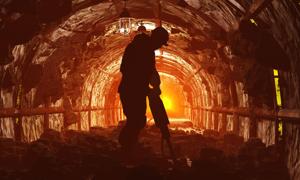West Virginia may need billions to reclaim coal land, report says

(The Center Square) – A new report indicates West Virginia as well as other eastern coal states may not have the bond funding needed to cover the costs necessary to prepare thousands of acres of mined land for new uses.
Appalachian Voices, a nonprofit environmental advocacy organization, said it found 633,000 acres across Alabama, Kentucky, Ohio, Pennsylvania, Tennessee, Virginia and West Virginia that need either partial or complete reclamation work. Accomplishing that is expected to cost between $7.5 billion to $9.8 billion, but the states only have $3.8 billion available.
The lands in question are mines that were established after Congress passed the Surface Mining Control and Reclamation Act in 1977. That law requires companies applying for a mining permit to post a reclamation bond, which would fund reclamation work in the event it was abandoned.
West Virginia edged Kentucky as the state with the largest amount of mined land – slightly more than 200,000 acres – needing at least some reclamation work. On top of that, Appalachian Voices fears West Virginia may have less than a third of the money available it would need to complete reclamation work.
The state has, according to the report, has more than $1.1 billion in bond funding available, and only Pennsylvania had more available. However, based on the scenarios listed in the report, the Mountain State could have nearly half of the funding it needs or less than a third.
Potentially, the report estimates West Virginia needs up to nearly $3.6 billion in funding to complete the work.
Mining companies are responsible for the reclamation work, but the report said it was unclear how much of the work those companies will be able to do.
“However, given the decline in the industry, it is clear that some reclamation obligation will fall to the states to address through state bonding programs,” the report stated. “How much reclamation obligation will be abandoned remains to be seen.”
The Appalachian Voices report actually paints a rosier picture for West Virginia than a state audit did last month. That audit, conducted by the Office of the Legislative Auditor, estimated the available bond funding may cover as little as 10% of the reclamation costs, and a massive closure last year showed the fragility of the state’s situation.
ERP Environmental Fund, which held more than 100 permits, stopped operations in the state and laid off workers last year. Its surety company Indemnity National Insurance Co. held the bonds for the mines, which were valued at $125 million, according to the legislative audit report.
However, both the state audit and the Appalachian Voices report noted the actual reclamation costs were significantly higher than the bond total, to the point it could have rendered Indemnity bankrupt and drained the state’s supplemental fund, which covers reclamation costs beyond the bonds for forfeited mines.
The state audit indicated there’s no known fallback plan in case funds were drained. Because of that, auditors recommended the legislature establish a study to come up with long-term solutions for the fund.
Erin Savage, a senior program manager with Appalachian Voices, said during a press conference earlier this month discussing the report that West Virginia is now taking the funding issue more seriously. However, even after advocates pressed state officials for years, she said it still took ERP’s failure to force action.
“I hope they continue to look at all available options to address this problem,” she said.
Appalachian Voices says mine reclamation isn’t just an environmental issue. It’s an economic issue as well since the reclamation projects would create hundreds or more jobs in areas where unemployment and poverty rates far exceed the national average.
In West Virginia, that could mean more than 12,800 job years. For perspective, that would supply five years of full-time work to more than 2,560 people in the state.
“Getting this reclamation started will literally put coal miners back to work, doing the reclamation that they were always supposed to be doing and that many of the workers that I’ve spoken with over my 10 years here want to do,” Erin Savage said.
Disclaimer: This content is distributed by The Center Square
